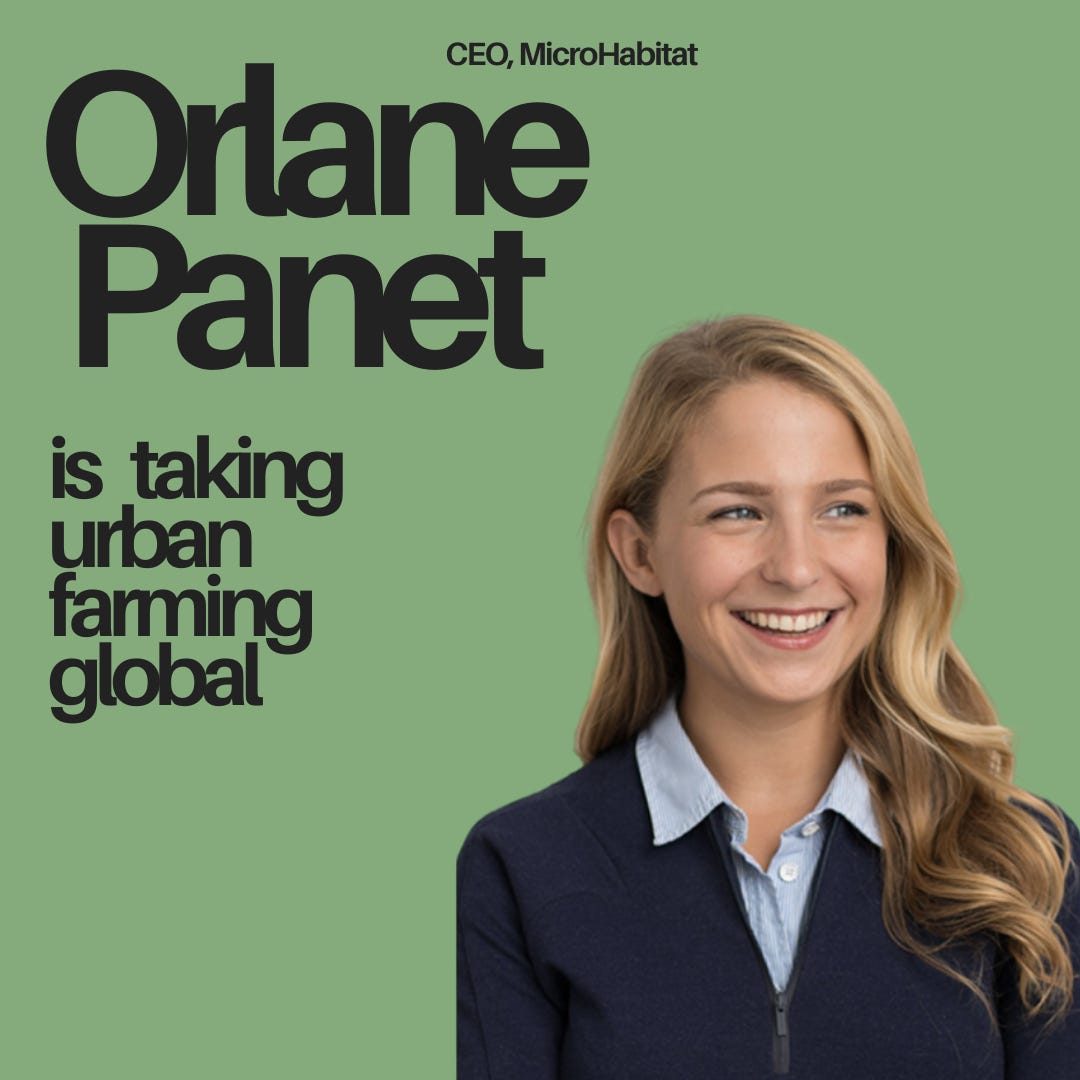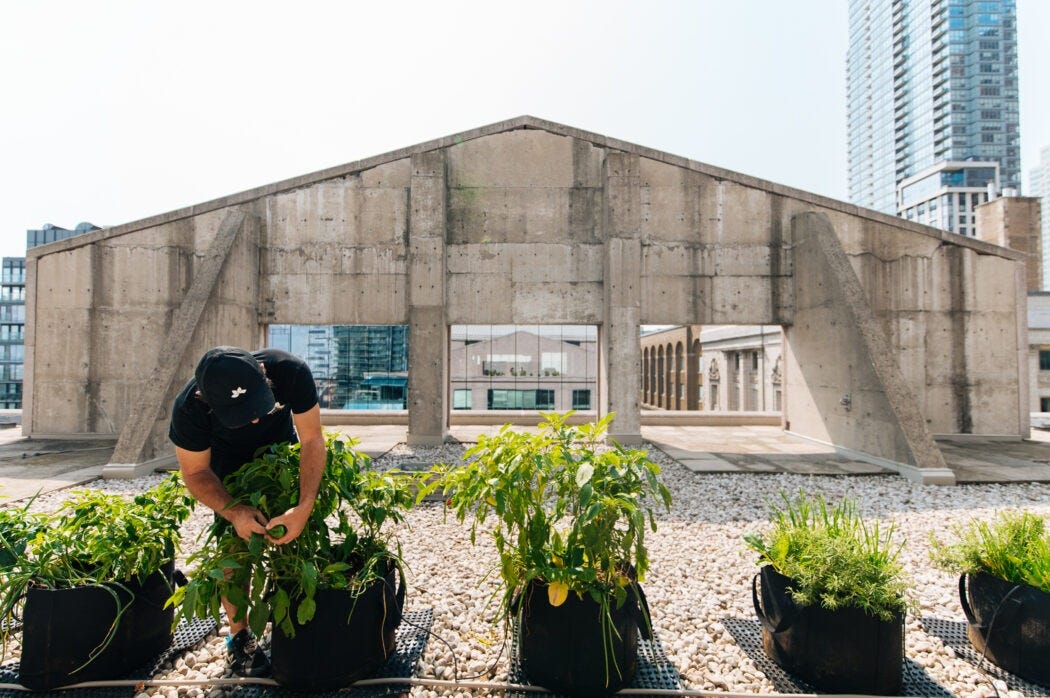Orlane Panet is taking urban farming global
MicroHabitat’s rooftop farms have transformed cities from Montréal to London - and they might be coming to yours next
Welcome to the June edition of Building Better, a monthly newsletter about Canadian business leaders building a better world. This week, I’m excited to introduce you to Orlane Panet, Co-Founder and CEO of MicroHabitat, the world’s largest system of private urban farms. Through innovative business models, she engages corporations and institutions to support local communities, improve tenant well-being, and activate meaningful social impact.
Meet Orlane Panet
To change the future of our planet, we must change the way we eat.
Globally, food production is responsible for 30% of carbon emissions and 80% of deforestation. But changing our food system is hard without an alternative model of what it might look like.
Luckily, Orlane Panet has dedicated her career to expanding the status quo and showing us what better might look like.
The Montréaler is the CEO of MicroHabitat, an urban agriculture company that transforms urban spaces into thriving micro-farms. Partnering with businesses and real-estate owners, Panet and her team manage the entire farm creation process, installing planters and sending staff to manage cultivation and harvest throughout the growing season.
For their customers, the benefits are wide-ranging. Some businesses work with MicroHabitat for the local produce generated by the farms - an asset for restaurants and a unique perk for corporate employees. Others use MicroHabitat farms as a way to fulfill their sustainability goals, donating the produce to MicroHabitat’s charity partners, such as The Breakfast Club of Canada or No Kid Hungry, in the U.S. Still others benefit from the heat reducing effects and enhanced water absorption of the gardens, which can reduce flood risk and lower temperatures, particularly for older buildings.
Whatever the reason customers come to MicroHabitat, they leave with a greater appreciation and understanding of local food systems and the benefits they offer communities. With more than 400 farms in 25 global cities, Panet’s movement is growing.
The city where it started
When Panet cofounded MicroHabitat in 2016, it was not yet clear that the company would grow to such success. Growing food in cities was a relatively new idea.
At the time, Panet was studying accounting at Montréal’s Concordia University, learning the ins and outs of spreadsheets. At the same time, she was growing increasingly concerned about the future of the planet.
When Panet’s friend Alexandre Ferrari-Roy, then an agricultural science student, told her about his newly started business venture and the idea for MicroHabitat, she jumped at the opportunity to combine her business skills with his knowledge of farming to address the problems she saw around her.
“I always wanted to have a purpose behind the job that I would do in life,” said Panet.
Like all entrepreneurial success stories, MicroHabitat began with one customer. The first client was the beloved sushi restaurant Park in Montréal’s Westmount neighbourhood. Ferrari-Roy and Panet farmed the site themselves, installing pots and maintaining plants while the fledgling company began to take root.
From there, MicroHabitat rapidly expanded to other clients and cities. Today, MicroHabitat operates over 400 urban farms in 25 cities, including Montréal, Toronto, and Calgary, as well as several international capitals. Their clients range from large corporations like KPMG to small businesses and individual building owners.
“More and more real estate has been realizing the importance of creating stimulating, vibrating, work and living environments, and so we're really aligning with that, providing a space that is going to be geared towards the wellness and the well-being of the occupants,” said Panet.
As the company has grown, Panet has shifted her role from getting her hands dirty on MicroHabitat’s farms to focusing on building relationships with large real estate funds and institutions that can accelerate the impact of MicroHabitat’s projects.
“In terms of policy, we still have a long way to go,” she said. There are still little to no monetary incentives to integrate urban farming and use nature to build a local food system and urban resiliency.
“If you have a business that's [...] feeding the local community, I believe that they should have tax credits. I believe that they should have access to grants. I believe that schools should also have access to these funds. There's so many ways that municipalities should be more proactive.”
Advice to young entrepreneurs
Panet encourages young entrepreneurs that it’s never too late to start a business but to go in with a clear business plan and concrete goals to measure your progress. She also advises that having skeptics can be just as important as having supporters.
“One tip I always give to people is that if you have a good business model and you think it's going to work, go sit down with someone that doesn't believe at all in what you're going to be doing. And then if you're able to convince them, I think you're really good to go.”
Inevitably, however, some things won’t go according to plan. But mistakes and setbacks can also be blessings in disguise.
“I think failure is just the best learning experience that one can have,” she said.
The Long Game
Panet is under no illusions that urban farming will solve all the problems in our food systems, but she sees it as a necessary step in the right direction.
“We're not going to say that we're going to be fulfilling the food demand for urban environments,” said Panet. “But I think creating that space, challenging the status quo, showing people that it's possible to grow tomatoes on the 50th floor of a building in Manhattan…helps others in the more localized food system around us. It creates a space for education and promotes others in that ecosystem.”
In cities where most people don’t know the first thing about where their food comes from or its impact on our health and the environment, MicroHabitat’s farms provide an educational touchpoint for what food can be.
And the appeal is universal. Panet’s projects have been welcomed across geographies and for many different reasons.
“In Texas, food autonomy and their freedom of their food system is something that they’re very keen on. In California, it's a lot more about sustainability. So having all of these different aspects in our sphere is allowing us to connect on so many different levels.”
These days, Panet has her sights set on further horizons, with new MicroHabitat projects opening in Europe and efforts beginning for a potential expansion into Asia and South America.
What started as a single rooftop garden in Montréal is now a global movement—one that challenges cities, businesses, and individuals to reimagine what’s possible.
Building Better is a monthly newsletter written by me, Sara Chiarotto O’Brien. By day, I’m a management consultant living in Toronto. By night, I write Building Better. You can learn more about why I started this newsletter here.
If you liked what you read today, consider subscribing below or share with a friend (you’ll make my whole day). And if you know someone who you think should be featured here, my messages are always open!






